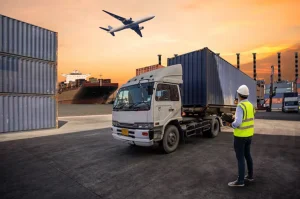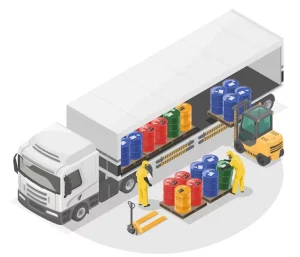What does a clearance broker do in logistics? They play a crucial role in ensuring cargo reaches its destination smoothly. They also ensure compliance with relevant regulations throughout the process.
Before delving into the specifics, it’s essential to grasp the fundamental concept of customs clearance. Customs clearance is the process through which imported or exported goods are inspected, verified, and released by customs authorities. It involves compliance with various regulations, documentation, payment of duties and taxes, and adherence to specific procedures.
A clearance broker, also known as a customs broker, acts as an intermediary between importers and exporters and customs authorities. They possess specialized knowledge of customs regulations, tariff schedules, and trade agreements, enabling them to facilitate the efficient clearance of goods while ensuring compliance with relevant laws.
Responsibilities of a Clearance Broker
Documentation Preparation: One of the primary responsibilities of a clearance broker is to prepare and submit all necessary documentation required for customs clearance. This includes commercial invoices, packing lists, certificates of origin, and any other relevant paperwork.
Customs Compliance: Clearance brokers must ensure that all imported or exported goods comply with applicable customs regulations. They are responsible for classifying goods according to the Harmonized System (HS) codes, determining tariff rates, and calculating duties and taxes owed.
Tariff and Duty Calculation: Calculating tariffs and duties accurately is crucial to avoid delays and penalties. Clearance brokers utilize their knowledge of tariff schedules and trade agreements to determine the correct duty rates applicable to each shipment.
Communication with Authorities: Clearance brokers serve as liaisons between importers and exporters and customs authorities. They communicate with customs officials to resolve any issues or queries that may arise during the clearance process, ensuring the smooth clearance of goods.
Risk Management: Identifying and mitigating potential risks related to customs compliance is another key aspect of a clearance broker’s role. They assess factors such as prohibited goods, restricted trade partners, and sanctions to ensure compliance and minimize the risk of penalties or delays.
Client Representation: Clearance brokers represent the interests of their clients throughout the customs clearance process. They provide advice and assistance to clients regarding compliance requirements, documentation, and customs procedures, helping them navigate the complexities of international trade.
Documentation Preparation
Clearance brokers are responsible for preparing various types of documentation required for customs clearance processes. These documents serve as crucial paperwork that facilitates the smooth movement of goods across borders. The specific documentation may vary depending on the nature of the goods, the countries involved, and the mode of transportation. However, some common types of documentation typically prepared by clearance brokers include:
Commercial Invoice: A commercial invoice provides a detailed description of the goods being shipped, including their quantity, value, and intended destination. It serves as a key document for customs officials to assess the duty and tax obligations associated with the shipment.
Packing List: A packing list itemizes the contents of each package or container within the shipment. It includes details such as the product description, quantity, weight, and dimensions. Customs officials use the packing list to verify the accuracy of the shipment contents against the accompanying documentation.
Bill of Lading (B/L): A bill of lading is a legal document issued by the carrier (e.g., shipping line, airline, or trucking company) acknowledging receipt of the goods for shipment. It serves as a contract of carriage and provides details such as the consignor, consignee, shipping route, and terms of transportation.
Certificate of Origin: A certificate of origin certifies the country in which the goods were produced or manufactured. It may be required to qualify for preferential tariff treatment under free trade agreements or to comply with import regulations related to country of origin labeling.
Import/Export Declaration: An import or export declaration is a formal statement submitted to customs authorities providing details about the imported or exported goods, including their value, quantity, and classification. This document is essential for customs clearance and compliance purposes.
Certificates and Licenses: Depending on the nature of the goods being imported or exported, additional certificates or licenses may be required to comply with regulatory requirements. Examples include phytosanitary certificates for agricultural products, sanitary certificates for food items, or permits for controlled substances.
Insurance Documents: Insurance documents, such as certificates of insurance or insurance policies, provide proof of coverage for the goods during transit. While not directly related to customs clearance, these documents may be required by customs authorities or shipping carriers as part of the overall documentation package.
Specialized Documentation: Depending on the specific requirements of the shipment or the industry involved, clearance brokers may need to prepare additional specialized documentation. This could include certificates of conformity, inspection certificates, or documentation related to intellectual property rights.
Choosing the Right Clearance Broker
Choosing the right clearance broker is crucial for smooth and efficient customs clearance processes. Several factors should be considered when making this decision:
Experience and Expertise: Look for a clearance broker with extensive experience in handling customs clearance for your specific type of goods and trade routes. A broker with a solid track record and deep industry knowledge will be better equipped to navigate complex customs regulations and procedures.
Regulatory Compliance: Ensure that the clearance broker is fully licensed and accredited by the relevant customs authorities. They should have a thorough understanding of local customs regulations, tariff schedules, and trade agreements to ensure compliance with all applicable laws.
Technology and Resources: Evaluate the broker’s technological capabilities and resources for customs clearance. A broker equipped with advanced customs clearance software and efficient communication systems can expedite the clearance process and minimize delays.
Network and Relationships: Consider the broker’s network of contacts and relationships with customs officials, freight forwarders, and other stakeholders involved in the clearance process. A broker with strong connections and a good reputation within the industry can facilitate smoother transactions and resolve issues more effectively.
Cost and Transparency: Compare the fee structures of different clearance brokers and ensure transparency regarding pricing. While cost is a factor, prioritize value for money and consider the broker’s ability to minimize duty payments, avoid penalties, and optimize overall clearance costs.
Specialized Services: If your shipments involve specialized requirements or unique challenges, such as hazardous materials or perishable goods, seek a clearance broker with expertise in handling such shipments. Specialized brokers can offer tailored solutions and mitigate specific risks associated with your cargo.
References and Reputation: Research the reputation of the clearance broker by seeking references from other clients or industry peers. Online reviews, testimonials, and recommendations can provide insights into the broker’s reliability, professionalism, and customer service.
Customs brokerage services from Toptrans
Toptrans offers comprehensive customs broker services to streamline your logistics operations and ensure hassle-free clearance of goods across borders. With our expertise and dedication, we empower businesses to navigate the complexities of global trade seamlessly.
Efficient Customs Clearance Processes
At Toptrans, we understand the importance of timely customs clearance for your cargo. Our team of experienced customs brokers leverages their in-depth knowledge and industry connections to expedite clearance processes, minimize delays, and ensure prompt delivery of goods. Whether it’s preparing documentation or coordinating with customs authorities, we handle every aspect with precision and efficiency.
Compliance Assurance
Compliance with import and export regulations is non-negotiable in today’s global marketplace. With Toptrans as your customs broker, you can rest assured that your shipments are in full compliance with relevant laws and regulations. From tariff classifications to valuation assessments, we ensure adherence to all regulatory requirements, mitigating the risk of penalties and fines.
Seamless Transit Across Borders
With our extensive network and expertise, Toptrans facilitates the seamless movement of your cargo across borders. Whether by land, sea, air, or rail, we ensure smooth transit and timely processing at ports and terminals. Our commitment to efficiency and reliability minimizes transit times and optimizes your logistics operations, enhancing your competitiveness in the global marketplace.
Tailored Solutions for Your Business
At Toptrans, we understand that every business is unique, with its own set of challenges and requirements. That’s why we offer tailored customs broker services to meet your specific needs. Whether you’re shipping perishable goods, hazardous materials, or high-value commodities, we have the expertise and resources to handle it with care and efficiency.
With Toptrans as your customs broker, you can trust that your logistics operations are in good hands. From efficient customs clearance processes to compliance assurance and risk management, we provide comprehensive solutions to streamline your international trade activities. Partner with us and experience the difference that our expertise and dedication can make for your business.








